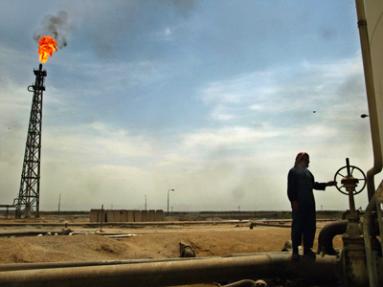Major oil service firms, including Halliburton, are expected to receive up to $40bn contracts, say Morningstar analysts—optimistically, $60bn.
The opportunity in Iraq is a State-privileged oil services industry playground, regardless of the production, Morningstar stock analysts report today via Business Insider.
Schlumberger, Baker Hughes, Weatherford, and Halliburton have committed to “boosting production capacity in Iraq to around 12 million barrels per day in six to seven years, from just 2.5 million barrels per day”. Reaching 11 per day in 2016 requires:
infrastructure, security, and political concerns are all mostly resolved, and the country becomes quite stable. The annual market size could approach $30 billion in 2016, and services contract awards could total $60 billion from 2010 to 2016 in this optimistic case.
With the force of the U.S. government, the “political concerns” are less a factor than internal instability and extreme violence may make it seem. These concerns, I expect, are namely the security of the fields, transportation and institutions that firmly ground the external control of substantial equity in the fields.
Existing contracts already will raise Iraq exporting capabilities to 4.5 million barrels per day.
If there is a political risk to these figures, it’s the nationalist Sadrist movement that waged a bloody war against the U.S. and its puppet government in 2006-07. “The Sadr movement has become one of the most influential groups in Iraq, winning about 40 seats in the March 7 ballot,” Nizar Latif reports at The National today, later adding: “And, according to members, it will waste no time in flexing its new parliamentary muscles: the 10 oil contracts signed between the government and major international oil firms top its agenda.”
The movement rejects the illegality of the contracts because they “were signed by the government without getting the approval of parliament and that is unacceptable”, according to Saleh al-Muhammadawi, a prominent member of the Sadr movement. “In pushing through these deals, the Iraqi oil ministry has exceeded its powers and acted beyond its legal authority.”
But he insists that foreign investment is “welcome” and they only “insist on reviewing these contracts”—which can be easily interpreted as wanting more of a cut to compensate for their loss in popular political capital as they compromise for more valuable ‘actually existing political capital’. “We are not saying at this point that the deals should be cancelled, just that the terms need to be adjusted. The contracts need to be reread and rewritten,” he added.
The expectation of the Morningstar speculators is that production could reach levels feeding as much as $40bn to service firms:
We have our doubts that Iraq can reach this level of production by 2016. At this time, we do not have enough data to make an informed estimate of achievable production levels in such a short time frame. However, if we assume that Iraq oil production reaches 8 million barrels per day by 2016, which reflects 75% of the committed targets, we expect there could be up to $40 billion in services contracts available from 2010 to 2016 for the industry’s drilling and services expertise….
Numerous industry consortiums bid successfully for contracts which, when added together, suggest that Iraq’s oil production capacity could reach 12 million barrels per day in six to seven years. Actual oil output will be based on market demand, and there is language in the contracts to compensate the oil and gas companies if oil production is reduced. A significant near-term hurdle is the passage of a comprehensive oil law that justifies the legal framework for the auctions….
If we assume that Iraq oil production reaches 8 million barrels per day, we think Iraq-related services revenue will start to ramp up in 2011, and cross $1 billion in revenue for each of the major services firms in 2013. By 2016, we estimate potential annual revenue will top $3 billion per firm. At that time, we assume over 400 rigs will be working, and the number of wells drilled will run between 1,500 and 2,000 annually. We believe about $40 billion in services contracts will be awarded to Western and Iraqi oil services firms over the next six to seven years for the necessary drilling and needed services expertise to develop the core Iraq oil fields.


























Social comments and analytics for this post…
This post was mentioned on Reddit by wiltedbouquet: Sweet. How can I get in on that?…
[…] This post was mentioned on Twitter by LittleAlex, duncan patterson, Aaron Hemlepp, LEE, Liberty Ideals and others. Liberty Ideals said: Morningstar: Iraq Oil Provides Up to $60bn in Service Contracts | Little Alex in Wonderland #libertarian http://bit.ly/b6UUN4 […]
[…] as long as foreign military presence gives them the ‘Iraq oil treatment‘. To compare, the most optimistic scenario for oil production in Iraq yields the potential for $60bn in contracting over the next six years. People can foolishly […]